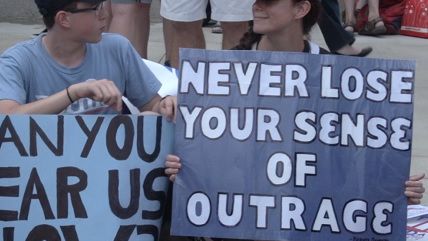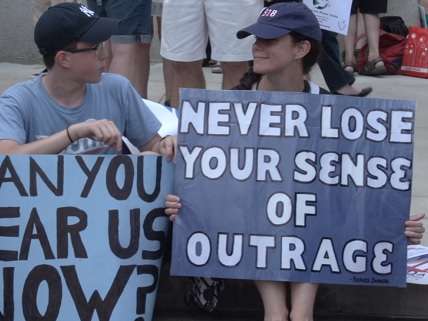Sanders Supporters Push to End Superdelegates, Closed Primaries, Make it Easier for a Trump to Win on the Democratic Side
Sanders supporters pushed for reform, got a committee that will set new rules by 2018 looking to open up primaries and limit superdelegates.


Bernie Sanders supporters participating in the Democratic National Convention's rules-making process were interested in abolishing superdelegates and opening up Democratic party primaries to independent and unaffiliated voters. They extracted from the rules committee a proposal for a "unity commission" that would work to create a process to bind superdelegates who are not members of Congress, governors, and former presidents to their state contests' results, as well as to open up the Democratic presidential primaries to independent, unaffiliated, and new voters willing to sign up for the Democratic party, the Washington Post reports. The effort "End Superdelegates," meanwhile believes that because a vote on abolishing superdelegates received more than 25 percent in the rules committee, the proposal will receive a minority report and a vote on the floor of the convention.
Either way, it's a far way from what Sanders voters wanted, but the creation of a commission also allows them to keep pushing more reforms. Sanders supporters argue that the superdelegate system created the impression that Bernie Sanders could not win, while closed primaries (New York required party registration several months in advance disenfranchised voters). But even in the absence of superdelegates Hillary Clinton received millions of votes more than Bernie Sanders. And disengagement by independent voters in local primaries in one-party jurisdictions, as I wrote this spring, contributes to the production of politically dysfunctional and corrupt political office holders like Philly's Chaka Fattah. Supporters of candidates like Bernie Sanders and even Ron Paul would have more influence working within a major or minor party than remaining unaffiliated and disengaged outside of presidential primary cycles with insurgent candidates, and would be less prone to the kinds of demagogues offering quick solutions but no substance.
The weekend after witnessing the nomination of Donald Trump by the Republican party seems like an odd time to for the other major party in the country to dismantle the internal checks and balances meant to prevent the party from being hijacked by cheap demagogues. If Donald Trump loses and the Republican party shakes itself loose of him, it ought to consider adopting superdelegates at the least, and even closing primaries. Instead, Democrats have made it easier for someone to try the Trump playbook out on them.
Many of Trump's voters were unaffiliated and independent, such voters in a fully open primary system could for a Trump clone on the Democratic side. Superdelegates, meanwhile, offer party leaders some control over the direction of their party. Republican leaders struggled throughout the year to mount an offensive against Trump, in part handicapped by the idea that they should not interfere with the primary process. Yet a party, even a major one, "belongs" to members of the party, not the general public. Certainly, the major parties themselves have contributed to this misunderstanding by taking public money where they can and embedding themselves into the electoral political process by winning privileges from the government that not coincidentally also serve to thwart the growth of minor parties.
But it is important not to treat political parties like public accommodations, especially how easy we have seen it to be for a would-be strongman to run a party's tables. Democrats tend to believe such a thing could not happen today, because they mistake the tone Trump takes, and not his wanton disregard for constitutional processes (largely because its shared by many Democrats), as the essential danger of a Trump presidency. But Trump has merely expressed a bipartisan disregard for the Constitution and belief in unilateral executive action without the usual obfuscation. That's earned him as many supporters as anything else, and makes maintaining, and for Republicans constructing, the kinds of checks and balances on a party-level that can stop such demagogues before they become too popular.


Show Comments (199)